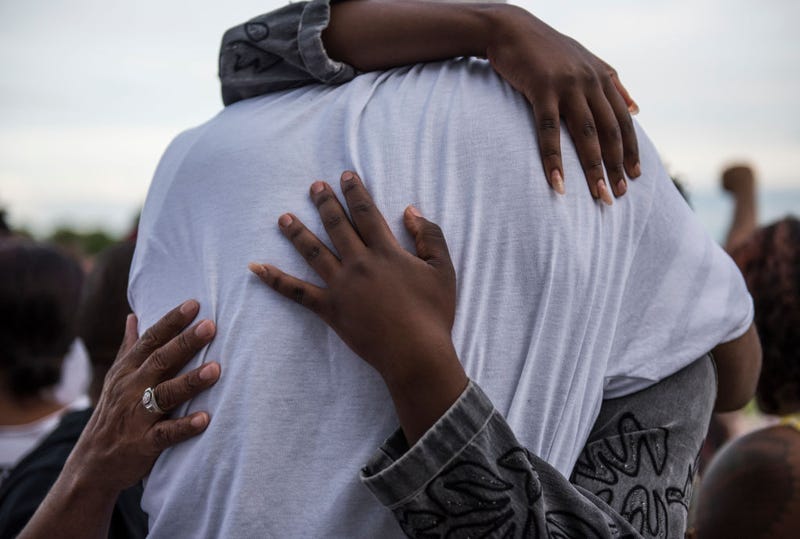
In Toni Morrison’s 1987 Pulitzer Prize-winning novel, Beloved, the character Baby Suggs has survived more than 60 years in slavery and has lost eight children. She preaches a sermon to a group of formerly enslaved people and beseeches her audience to love themselves—their hands, their backs, their hearts, their laughter, their dances, their very flesh—because others do not:
On Friday afternoon, the announcement that Jeronimo Yanez, the police officer who fatally shot Philando Castile, had been acquitted of all charges, brought many people to something like “this here place” that Morrison described in Beloved. Yanez had been charged with second-degree manslaughter and endangering safety. Protesters outside the governor’s mansion in St. Paul, Minn., expressed disbelief, outrage and anguish. But for some, there was no surprise at all. Numerous investigations of police shootings and other in-custody deaths have ended with no convictions and no accountability—the deaths of Sandra Bland, Alton Sterling, Terence Crutcher, Eric Garner, Michael Brown, Rekia Boyd, Tamir Rice and Aiyana Jones, just to name a few—so why would one expect this case to be any different?
Perhaps the anticipation that this case might end with a conviction centered on the role of Diamond Reynolds, Philando Castile’s girlfriend, and her extraordinary courage and composure in capturing the tragedy on Facebook Live. Reynolds enabled viewers to see for themselves that Castile had followed every one of Yanez’s instructions precisely.
On Tuesday, the video from the dashboard camera from Yanez’s car was released. The video begins with Yanez on the radio with a colleague. He states that Castile and Reynolds “just look like people who were involved in a robbery.” Yanez claims that Castile’s “wide-set nose” resembles a robber’s nose. When Yanez turns on his flashing lights, Castile immediately pulls his car over to the side of the busy street.
The interaction begins calmly. But soon Yanez becomes agitated and nervous (a word he later used to describe himself) after Castile says, “Sir, I have to tell you that I do have a firearm on me.“
Castile repeatedly told Yanez that he was not reaching for his gun and that he was not pulling it out. Reynolds also said, “He’s not pulling it out.” Seconds later, Yanez fired seven shots into the car. Castile moaned, “I wasn’t reaching.” Those were his last words.
The near silence of the National Rifle Association about this case has been deafening. The organization, which has rallied to the defense of other gun owners, has not supported Philando Castile. The NRA issued a detached statement with banal promises to say more “once all the facts are known.”
Most of the facts are known: They are visible on the video captured by Reynolds, who answered every question that Yanez asked thoroughly and respectfully, even calling Yanez “Sir” after he killed Castile. Yanez claimed that he feared for his life, a threadbare excuse used to imply that African-American men are inherently dangerous even when they are in vulnerable positions, like sitting in a car, wearing a seatbelt, for example.
The irrational stereotype of the “black brute” circulated widely in late-19th and early-20th-century white supremacist rhetoric and was used to justify lynching. But what did Yanez have to fear in Castile, a beloved and longtime cafeteria supervisor and a role model for children at the J.J. Hill Montessori Magnet School in St. Paul? A man who had memorized the names and food allergies of the 500 children he saw each day?
“You shot four bullets into him, Sir,” Reynolds told Yanez. Reynolds was ordered out of the car and handcuffed. Her 4-year-old daughter was in the backseat and witnessed the harrowing incident. Dae’Anna Reynolds demonstrated remarkable courage, and when her mother started to cry, she reassured her by saying, “It’s OK. I’m right here with you.”
As Nekima Levy-Pounds, the president of the Minneapolis chapter of the NAACP, explained, “It is not uncommon to treat black victims and witnesses as criminals in these types of cases.” Levy-Pounds explained that Tamir Rice’s 14-year-old sister was tackled to the ground, handcuffed and ordered to the back of a police car as she ran to her dying 12-year-old brother.
The acquittal of Jeronimo Yanez raises questions with no answers. In the book, In the Wake: On Blackness and Being by literary scholar Christina Sharpe, political scientist Joy James and anthropologist João Costa Vargas asked, “What happens when instead of becoming enraged and shocked every time a black person is killed in the United States, we recognize black death as a predictable and constitutive aspect of this democracy? What will happen then if instead of demanding justice we recognize … that the very notion of justice … produces and requires black exclusion and death as normative.”
What happens to our democracy when we become accustomed to the sight of inconsolable black mothers grieving yet another loss? Valerie Castile cried out, “A city has killed my son and the murderer gets away.”
The trauma that Toni Morrison described in Beloved remains with us. As Sharpe has argued, this trauma keeps black lives “in the wake” and makes black death frighteningly unremarkable. Sharpe uses the metaphor of “the wake” as a means of “seeing and imagining responses to the terror visited on Black life.” Sharpe explains that she is “interested in the ways we live in and despite that terror.”
Terror makes us question the kind of society that we are living in, when one group lives in a constant state of anguish and bereavement, an anguish that should be shared by all. If we all are not mourning the death of Philando Castile, then, Valerie Castile said, “we are not evolving as a civilization, we are devolving.”
Allyson Hobbs is an associate professor of history and director of African and African American Studies at Stanford University. Follow her on Twitter.



